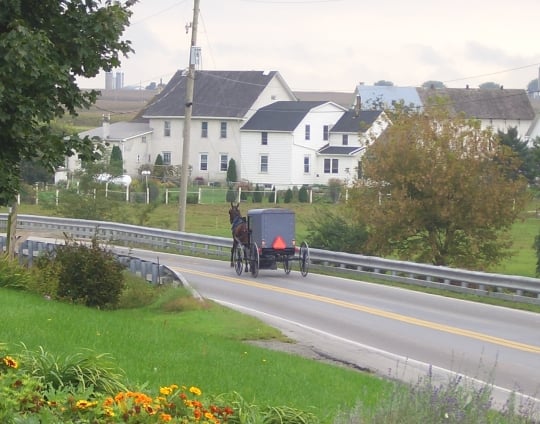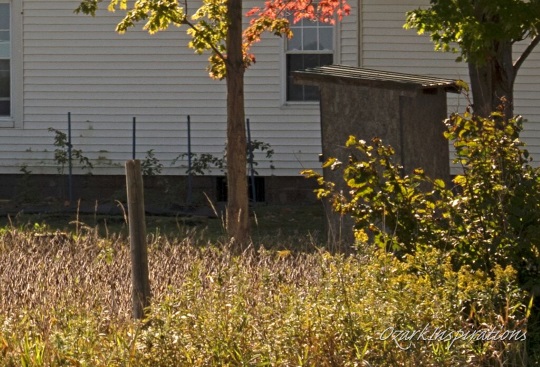Lancaster Amish Moving Into Towns & Subdivisions
Lancaster Online reports on an increasingly popular option for housing among Amish in Lancaster County:
But as their numbers grow, more Amish want to live in a village, town or suburban development and have a small stable for a horse, just as the non-Amish have garages for cars.
“It’s become a trend among the Amish community to live on these smaller residential lots as they come off the farm and are no longer choosing to do agriculture,” said Mark Deimler, an engineer who provides zoning enforcement for Lancaster County municipalities.
Who is moving into these “non-traditional” residences? The option appeals to young families who can only afford starter homes in the high-dollar local real estate market, as well as older couples who wish to downsize after all or most of their children have fled the coop. I can also see this being attractive to unmarried Amish, those bachelor or “old maid” households.

This isn’t exactly a new trend, as Amish have been living in town for a long time already. I often came across it 10+ years ago in places like Topeka, Indiana or Mt. Hope, Ohio.
However, this shift has sometimes meant conflict with local zoning boards in some townships. The main issue is the stabling of horses.
To keep a horse, most areas require a larger lot than those typical of suburban neighborhoods and villages. Amish have reportedly walked out of meetings having felt insulted during the proceedings, Lancaster Online reports. In other cases, authorities have been more flexible in adapting zoning to Amish needs.
Perhaps the most interesting part of this article were the comments from an area Amish realtor (not your typical Amish occupation, but you’ll find a few in the larger settlements):
Chester Lapp, a real estate agent and member of the Amish church, said horses may not be appropriate for some neighborhoods.
“I don’t like seeing the Plain sect buying in cul-de-sacs where it’s 99% non-Amish and their horse poops on the road,” Lapp said.
He said he would hope that Amish seeking zoning relief would abide by Anabaptist teachings and approach municipal leaders with graciousness and respect.
Sounds like Chester knows how to relate to the concerns of non-Amish residents, which is about what I’d expect from an Amish realtor.
Don’t expect to see “Amish in the city” anytime soon. But the trend of living on smaller lots in towns and villages, and subdivision homes, is apt to continue. Though it appears Amish will have a smoother go of it in some places than in others.







Interesting....
Wow, I wasn’t exactly expecting that. I’ve been to Lancaster Co. twice, and understand things are a bit different there compared to a lot of the Amish world. And I know a lot of the Amish there even have in-town jobs…, and so living in town would make for a lot of scooter-miles saved each year. (They tend to use push scooters instead of bicycles.) But I guess I wasn’t thinking that there would be a significant element within the group that would actually want to move into town — or that their church would let them. My mind contrasts that to the small town of Jamesport, MO (population approx. 500) where the church had to make a special exception to allow an Amish mother and daughter move into town because of serious health issues. So while I have no personal problem with any of them moving where they want to, this one was a bit more out in left field and surprised me a little.
Should be O.K.
Should not be a problem . If a horse is O.K.in the neighborhood for them then every one should be allowed to have a horse if the want . And if you don’t mind your road being tore up by horses hooves and don’t mind horse poop on your street by all means approve of it !
2 worlds starting to collide.
This certainly is another cause of friction between the Amish and Englisch neighbors.
Only about one-third of the Amish in Lancaster and the surrounding area are farming(According to the article link). This means more and more are living in homes in Englisch neighborhoods.
This is what I try to tell people. They are slowly getting pressure to change. How can they keep a horse on a property so small?
This causes some to consider allowing car ownership. It’s just too dangerous to use horse and carriage on the congested roads in these over-developed areas. And since many use driving services as much as they do, as well as have their kids drive them, they may as well allow the baptized to own and drive themselves.
Plus these neighborhoods are constantly exposing the Amish to Englisch life.
I could tell stories about how many Amish youth in these neighborhoods enjoy the local high school and college parties. The saying is, ‘When the parents are away, the Amish kids will play.”
Some young Amish don’t speak much PA German. They say it’s because there is no need for it. Their friends in these neighborhoods are often Englisch. At work, customers and co-workers are often Englisch. Again, no need for the PA German language. Sometimes they use it with family or at church. But they admit that happens less and less.
Just listen to the Amish youth speak and then listen to their parents or grandparents. Often the PA German ‘accent’ is stronger with the elders.
Amish in Kansas
I live in rural Wakefield,Kansas. And the Amish have come to my area. So far 5 houses have gone up. Rumor has it that they are from Lancaster,Pa & we English can expect 300 Amish. I do wonder how they will support themselves. If anyone has any information about this, I’d really appreciate a response. Thank you.
Hypocritical
I have to laugh at Chester’s concerns for the non-Amish. The non-Amish just approved two controversial developments in a traditionally Amish/Mennonite area with few saying how that will effect the Amish. A matter of fact, you have non-Amish who move to Amish areas and than complain about Amish horse droppings. It is more stupid when you realize these cul-de-sacs are largely built on plots of land that Amish/Mennonite horses use to till.
I’m sure the Amish think the same every time a car breaks down on the side of the road, every time a tire blows out and pieces litter the road, or every time they pass an oil spot, or a truck zooms past them with smoke clouding their horses.
Yes, it is workable. Prior to cars, horses were used everyday and in every type of community. People who lived in cities had horses in garages of stables without even half an acre of land or any grass land at all. In my city, horses occupied the majority of garages until the early 1920s. Even into the early 1950s, some people still had horses and used them to push around carts. These horses were never grass fed in a field. Instead, just as gas stations today sell oil by the gallon, shops sold bushels of hay.
Ordnance’s passed since those times do not reflect on reality. Many of the existing garages in my city are over 100-yrs old, and before they were converted for car use some 80-90 yrs ago, they were used for horses. I suggest those make the case for horses show photos of the turn of last century when cities, more congested per square mile than some cities today, had horses used.